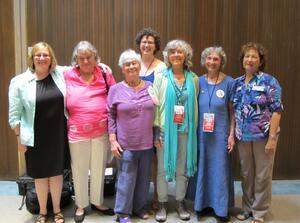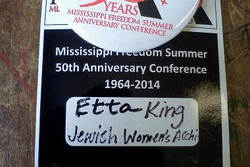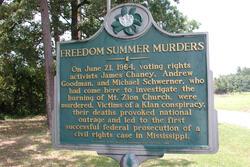Letters from Jackson: Day 3
JWA's Etta King is in Jackson, Mississippi this week to attend a conference commemorating the 50th anniversary of Freedom Summer. Following in the tradition of other Northerners who went South, she is writing me a letter each day to reflect on her experiences there. I hope you find them as educational and entertaining as I do. —Tara
Dear Tara,
In Judaism, we take the seventh day of the week to slow down. To separate between the holy and the everyday. As legendary civil rights activist and Jewish thinker Rabbi Abraham Joshua Heschel wrote in his book The Sabbath, “on the Sabbath we especially care for the seed of eternity planted in the soul.” Shabbat in Jackson was indeed a time to germinate and cultivate the ideas that have been spinning around in my head.
On Friday night we gathered to hear testimony from three Jewish Freedom Summer Veterans: Heather Booth, Mark Levy, and Larry Rubin. I sat next to two other veterans Vivian Rothstein and Annie Popkin. Each one of these people has an incredible story. When considering Freedom Summer, I used to think about the big names like Bob Moses and Rita Schwerner. What this Shabbat—and really this whole week taught me—is that every single person in the Movement put their life on the line and has the scars and stories to prove it. And the veterans of Freedom Summer really are veterans. I was surprised to discover how awe-inspiring it was to be in their presence. As we sang side-by-side, recited traditional prayers, and lit the Shabbat candles together, I truly felt the “holiness in time” that Heschel describes.
On Friday and Saturday, the Institute for Southern Jewish life organized some programming specifically about Jewish engagement in Freedom Summer. We ended with an incredible intergenerational conversation about how we carry this Movement forward and how we use our strength and voice as a Jewish community to secure voting rights, access to health care, and equity in education for all people living in the United States. We struggled, as many Jews do, with the role that Israel/Palestine should play in our justice work, and debated the merits and challenges of calling out or highlighting a social justice legacy that is specifically Jewish.
The most exciting thing for me was that the veterans and older members of our gathering were eager to hear my ideas and challenge my assumptions. I thought about how rare it is for me to interact so candidly, authentically, and practically with people from different generations than my own. This commemoration brought all of us together around a shared memory and then united us in a common purpose. It was profound, energizing. My heart sang.
I am sad to leave Mississippi and come home to the day-to-day tasks of work and home life. I wonder if the Freedom Summer volunteers had the same sense when they left (though many of them never really left the Movement). There is nothing quite like sitting in a room with a thousand other people and knowing that you are feeling the same thing, imagining the same future, and sharing a common vision. I am honored to have witnessed this incredible moment and I feel more than ever that my work at JWA is important. We must seek out these stories. We must write them down. We must share them. And we must begin to write our own.
Love,
Etta






